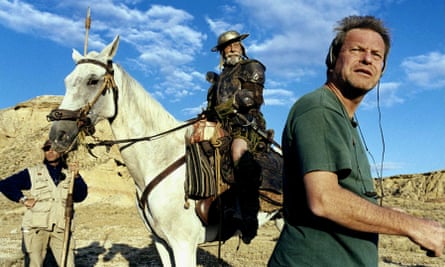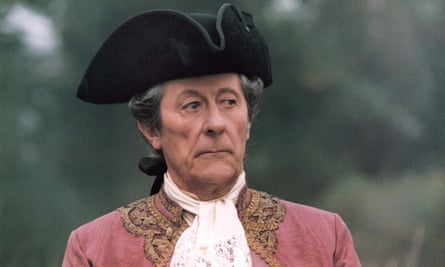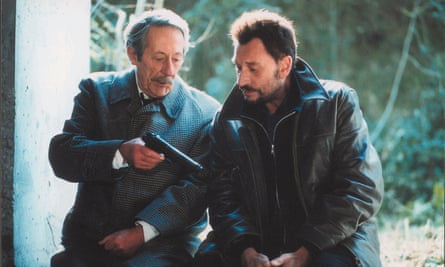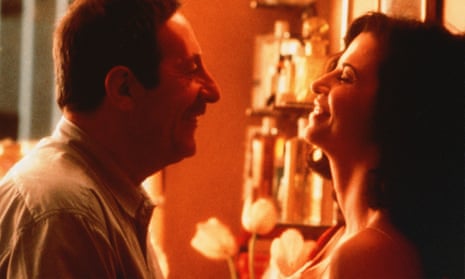With his lean, tall figure, his sunken, weary features, doleful eyes, moustache and prominent nose, the French actor Jean Rochefort, who has died aged 87, seemed born to play Don Quixote. Terry Gilliam thought the same when in 1998 he cast Rochefort as the idealistic and impractical Don in The Man Who Killed Don Quixote, which was also to have featured Johnny Depp and Vanessa Paradis in leading roles.
Everything was set up when Rochefort fell ill with prostate problems that meant he could not sit on a horse. Shooting was abandoned after a few days because Gilliam would not replace Rochefort. Despite many attempts to restart the project (which themselves became the subject of the 2002 documentary Lost in La Mancha), with different actors as Quixote (most recently Jonathan Pryce), the film was completed only earlier this year and has yet to be released.
Rochefort’s distinctive, cadaverous looks were part of French cinema from the late 1950s onwards, though it took him nearly two decades to gain international renown. However, in the 70s, he firmly established a reputation as a comedy star of sex farces (most of them directed by Yves Robert) and black comedies.
In the Robert films, he was often an unfulfilled middle-aged married man who has a fling. For instance, in Un Eléphant Ca Trompe Enormément (released in the US as Pardon Mon Affaire, 1976, and later adapted to become the Gene Wilder movie The Woman in Red), Rochefort, although happily married, decides to pursue the girl he sees on an advertising poster. He spends the night with her, which ends with a farcical exposure of his dalliance. This was followed by Nous Irons Tous au Paradis (Pardon Mon Affaire, Too! 1977) and Courage Fuyons (1979). In the latter, he is the insignificant married proprietor of a small Paris chemist shop, who gets involved in the 1968 Paris riots and ends up in Amsterdam with a glamorous singer (Catherine Deneuve).
In 1974, Bertrand Tavernier allowed Rochefort to prove his dramatic credentials in The Clockmaker of Saint-Paul and Que la Fête Commence (Let Joy Reign Supreme), in both of which there was some agreeable interplay between Rochefort and Philippe Noiret. In the former, he was a police inspector having to deal with the father (Noiret) of a boy wanted for murder, and in the latter he played a lascivious priest in the corrupt court of Philippe d’Orléans (Noiret).

Rochefort’s particular brand of irony was nicely displayed in Philippe de Broca’s Le Cavaleur (1979) in the role of a concert pianist frenziedly chasing after women before he feels it is too late.
He was born in Paris, son of Céléstin Rochefort, who worked at the Banque de France and then in the petrol industry, and his wife, Fernande (nee Guillot). The family’s origins were in Britanny, where Jean spent holidays with his grandparents, and lived in later years. He trained as an actor at the Paris Conservatoire in the 50s at the same time as Jean-Paul Belmondo, but had to halt his studies due to military service.
On his return to Paris, he started performing in cabaret and in plays, on stage and on television. In 1960, with Delphine Seyrig, Rochefort appeared in a number of plays primarily by British playwrights, including Harold Pinter, James Saunders and Peter Nichols, but from 1970 he devoted himself almost entirely to films.
His debut had come in the small role of an intern in Rencontre à Paris (1956), a frivolous episodic comedy. However, he was soon making a name for himself in costume dramas – he always seemed at ease in a powdered peruke – the first being Captain Fracasse (1961), adapted from the Théophile Gautier novel, through which Jean Marais swashbuckled his way. Rochefort again supported Marais as D’Artagnan, in The Iron Mask (1962). Rochefort impressed as Count Almaviva in an excellent TV version of Beaumarchais’ play The Marriage of Figaro, with Jean-Pierre Cassel in the title role.

Also in the 60s, Rochefort appeared in three popular bodice-rippers revolving around Angélique (Michéle Mercier), the daughter of a penniless nobleman at the court of Louis XIV. They were Angélique, Marquise des Anges (1964), Angélique: The Road to Versailles (1965), and Angélique and the King (1966), in all of which Rochefort played the heroine’s bête noire, a devious lawyer turned policeman.
After the success of the 70s, much of his work in the 80s was in films mainly for local consumption until a fruitful collaboration with the director Patrice Leconte in around half a dozen films. Tandem (1987) was the start of a new maturity for the director and for Rochefort, who struck a tragicomic note as the ageing host of a radio game show. Rochefort gave a wonderfully impish performance in the title role of Leconte’s quirky romantic fable The Hairdresser’s Husband (1990), charming enough to convince audiences that a lovely young woman would be attracted to him.
He was back in period costume in Leconte’s Ridicule (1996) as the Marquis de Bellegarde, a witty mentor of a young newcomer at the court of Louis XVI. In complete contrast, in The Man on the Train (2002), Rochefort played a retired poetry teacher who exchanges his dull life with that of a bank robber (Johnny Hallyday). There was something quixotic about many of his roles. Some consolation, perhaps, for not getting to play Don Quixote, which had been his dream.

He continued into his 80s, with later films including Tell No One (2006), Mr Bean’s Holiday (2007, in which Rochefort as a Parisian maitre d’ serves Mr Bean a dish of fruits de mer), and Astérix and Obélix: God Save Britannia (2012).
He is survived by his second wife, Françoise Vidal, whom he married in 1989, and their daughters, Louise and Clémence; by three children, Marie, Julien and Guillaume, from his first marriage, to Alexandra Moscwa, which ended in divorce; and a son, Pierre, from a relationship with Nicole Garcia.

Comments (…)
Sign in or create your Guardian account to join the discussion